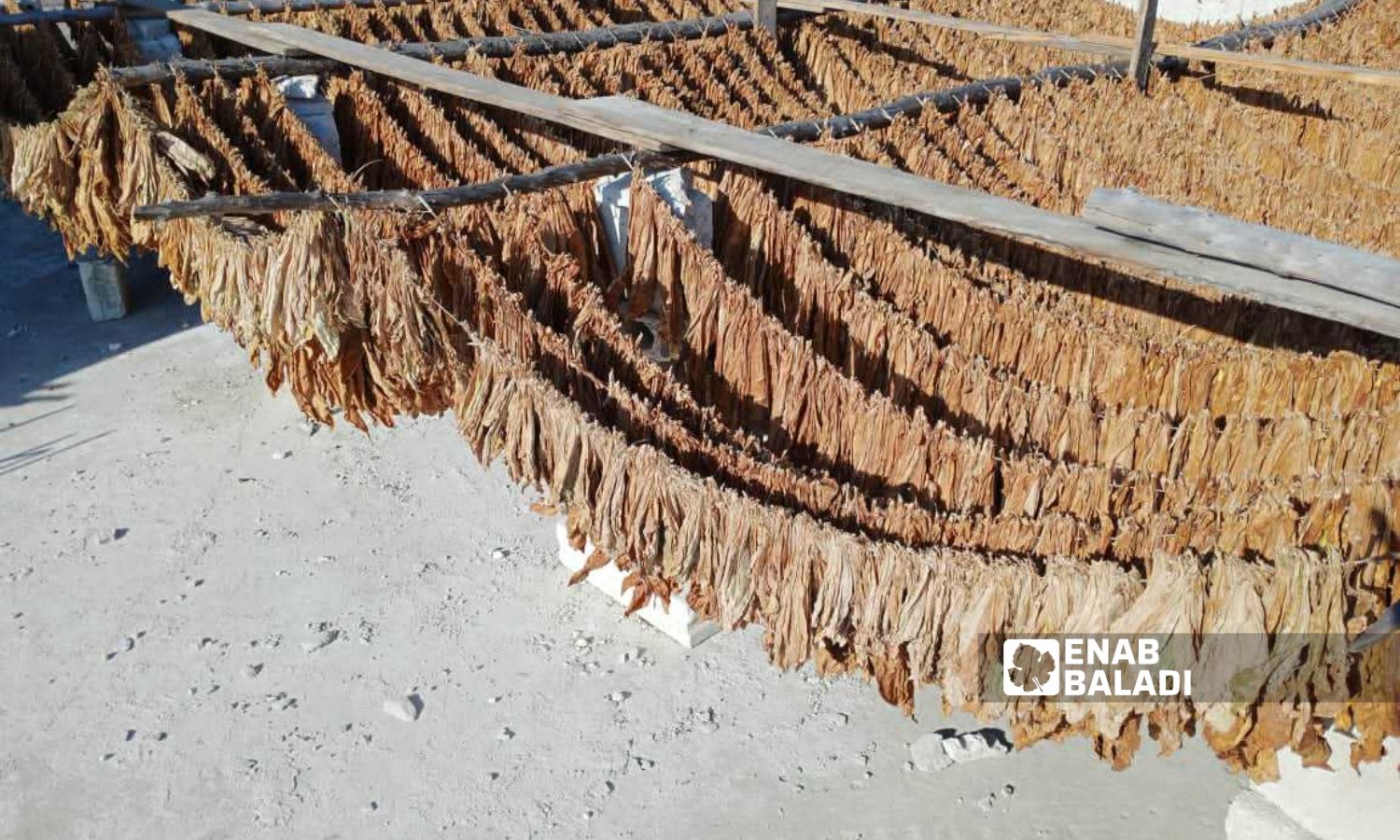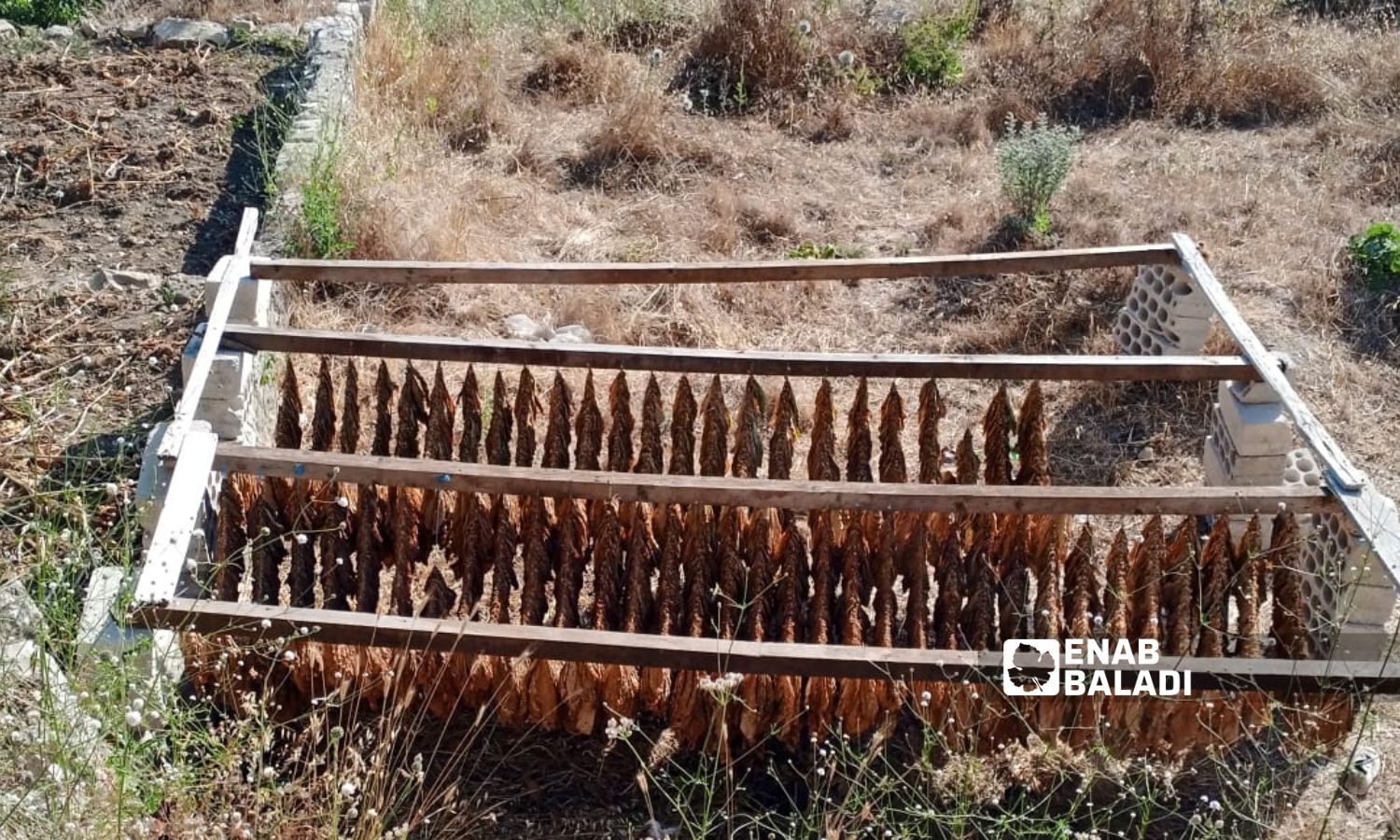



Latakia – Linda Ali
The 48-year-old Ali was forced to irrigate his tobacco crop in the coastal Jableh region to produce a new season that is locally called “al-Zaghfa.”
A double effort Ali paid in order to present it to the Tobacco Corporation (Régie), which monopolizes the tobacco industry, instead of the main tobacco crop, which he decided to sell to people who pay several times more than the state-owned corporation price.
The assessor or the estimator is an employee sent by the Tobacco Corporation to the tobacco farmers to estimate the amount of production for their seasons and put a specific number per kilo.
He estimated Ali’s harvest at 100 kilograms and reduced it to 70 kilograms after Ali offered him 30,000 Syrian pounds as a bribe.
Tobacco farmers in Latakia and its countryside are forced to plant “bad” and lower-quality varieties to hand them over to the Tobacco Corporation, sell their basic production to whoever pays the most, and pay bribes to some of the Corporation’s employees to reduce their estimates of the amount of land production.
Last March, the government of the regime set the price of buying tobacco from farmers at 7,500 pounds per kilo for hookah tobacco, 7,300 pounds for “al-Burli,” “Virginia” at 8,300, and “al-Basma” at 10,500, and “al-Barleb,” “Shak al-Bint” and “Katrine” at 9,500 Syrian pounds, while farmers and merchants pay prices that exceed 70,000 Syrian pounds per kilo ($1=15,500 SYP).
All of Ali’s attempts to convince the assessor to reduce the amount he estimated for production failed until the latter demanded an amount of 1,000 Syrian pounds for every kilo he reduced, and the farmer had only 30,000 pounds, so he gave it to him in return for the reduction.
Ali decided to water the season and take care of the “al-Zaghfa” that produces a season of lower quality, to sell it to the state Tobacco Corporation, and leave his main crop to sell it to other people who buy one kilo of it for more than 70,000 SYP, depending on how it is sold, whether as rolling paper or ready-to-drink tobacco or dry with strings, according to the farmer’s description.
The prices of purchasing the tobacco crop by the regime’s government increased from 2022 between 2,000 and 3,000 SYP, which is an insufficient increase against the crop production requirements, Ali said.
The farmer described the prices as unfair and plain theft, adding that the specified prices are calculated for the first type, and in order to be calculated as well, they, as peasants, have to pay a bribe to a person called the expert, who determines the type in the Tobacco Corporation, and the bribe ranges between 2,000 and 3,000 SYP for each parcel of tobacco (the parcel about 20 kilograms).
“With all these bribes, we only have a small amount of the season’s crop left, so we resort to selling tobacco to other people who buy it from our house, at double prices, without the need to bring a means of transportation, to transfer the crop to the Tobacco Corporation,” Ali added.

Tobacco harvest in the village of al-Dalia in the countryside of Jableh city in the coastal Latakia governorate, northwestern Syria – July 2023 (Enab Baladi/Linda Ali)
Ismail, a pseudonym, one of the employees in the valuation committees, defends bribery, saying that it is “their right” (for the estimators), adding, “Certainly the state knows that we will not be able to feed our children from salaries that do not exceed nine dollars.”
Ismail confirmed that bribery is something that is agreed upon between them as committees and the managers responsible for them, as each person among them has his share of it, adding that “the value of the bribe, just like the price, is determined by the managers after the government determines the purchase price of tobacco.”
Ismail’s stance is backed by another estimator in the Tobacco Corporation (who asked not to be named), saying, “For example, the farmer hands over his low-quality season’s harvest, which we price as first type at 7,500 pounds, while its actual price as third or fourth type doesn’t exceed 3000 or 4000 pounds. Therefore, if we take a thousand pounds or two thousand per kilo, the farmer remains the winner.”
Estimators and experts in determining the type of tobacco are accused of “corruption.” Local social media circulated video recordings in 2022 in the coastal city of Tartus, accompanied by leaflets that the tobacco expert does not give farmers their rights and that he classifies a good production of the first type as a third type.
Khawla, 52, a widow who lives in the countryside of Latakia, used to cultivate her land with tobacco crops to cover her family’s needs, but the production costs made her season less productive than it was in the past.
The farmer woman could not buy the necessary fertilizer after the price of one bag (50 kilograms) reached more than 400,000 pounds, while her land needed three bags of it, which she reduced to one bag because she did not have enough money at the time.
The land needs to be plowed twice, and the cost of plowing one dunam is 75,000 Syrian pounds, according to Khawla. She said that workers’ wages constitute an additional burden, as the daily wage for a worker is no less than 30,000 pounds.
Khawla does not want to sell her crops for free, and she will not allow the Tobacco Corporation to steal her efforts, according to her, especially since the tobacco season is one of the most demanding seasons.
The work of tobacco farms begins from the moment the seedlings are planted between February and March, then followed by the stage of digging around them, after that trimming the head, then picking the lower leaves, then picking the whole seedlings, all the way to placing them in designated threads, drying them under the sun, and then returning them to the house to complete the process of sorting the leaves and placing them in parcels weighing about 20 kilograms.
Last April, the Director of Agriculture and Scientific Research at the General Corporation for Tobacco, Eng. Ayman Qara Falah told the local newspaper, al-Watan, that the estimated amount of production for this season is about 4.5 million kilograms of tobacco of various types.
Qara Falah did not hide the difficulties facing the farmers, who do not get enough diesel fuel to secure plowing and watering the land, describing the amounts given to the farmers as very limited, adding that the tobacco farmers do not get fertilizers from the Agricultural Bank.
The official stated that the Tobacco Corporation transfers the crop from the production areas at its own expense to storage warehouses, while the farmers denied this.
The latest statistics on the tobacco crop in the areas controlled by the regime were for the year 2022, and the cultivated area amounted to 6,594 hectares, and the amount of production amounted to 9,597 tons, according to the Syrian Prime Ministry, while the latest statistics on tobacco in Latakia were in 2021, and the cultivated area amounted to 21,500 dunams, and production reached then to 3,387 tons.
if you think the article contain wrong information or you have additional details Send Correction